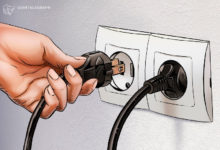Ark Invest’s Ex-Lead Says He’s Buying Solana, Here’s Why

The former lead of Ark Invest’s cryptocurrency division says he is ready to support the dying Solana network and agrees with the most recent thread shared by Vitalik Buterin. He also has his own reasons, as described in a series of Twitter posts.
First of all, Burniske believes that Solana’s ecosystem is filled with talent and developers who will be able to push innovation on the network independently from what we can find in Ethereum or Cosmos, even without the support of venture capital that has been pushing Solana’s competitors forward.
1/ Still longing $SOL while haters spinelessly pile onto the downside momentum. When @solana recovers, it’s not me that will be haunted by the thought, «Instead of jeering, I could have been buying $SOL ~$10.»
— Chris Burniske (@cburniske) December 30, 2022
According to Burniske, some of the devotees of Solana are «hardware junkies,» and others are network optimization enthusiasts who are committed heavily to making Solana a better ecosystem. The validator community has also joined Solana not only because of the financial opportunities, but they are genuinely excited about what the whole system can achieve.
Burniske also highlighted the personality behind the network, saying that Anatoly Yakovenko is more pragmatic than Vitalik Buterin or the founder of Cosmos, which may push some to believe that he has betrayed some of his crypto ideals, while in fact he is simply trying to build a more efficient future for blockchain.
From a technical perspective, creators on Solana often blend Web2 and Web3 technologies, which means they understand the backend of what they create and have enough skills to produce front-ends and make the network friendlier to the mainstream.
The period Solana is going through right now is complicated, but mistakes made along the way will only make it stronger, believes Burniske. Unfortunately, there is nothing to do with Solana but wait and see: either a revival and morphing into Ethereum 2.0 or the same fate as networks like EOS.






 Bitcoin
Bitcoin  Ethereum
Ethereum  Tether
Tether  USDC
USDC  TRON
TRON  Dogecoin
Dogecoin  Cardano
Cardano  Bitcoin Cash
Bitcoin Cash  Chainlink
Chainlink  Zcash
Zcash  Monero
Monero  LEO Token
LEO Token  Stellar
Stellar  Litecoin
Litecoin  Hedera
Hedera  Dai
Dai  Cronos
Cronos  Tether Gold
Tether Gold  OKB
OKB  Ethereum Classic
Ethereum Classic  KuCoin
KuCoin  Gate
Gate  Algorand
Algorand  Cosmos Hub
Cosmos Hub  VeChain
VeChain  Dash
Dash  Tezos
Tezos  TrueUSD
TrueUSD  Stacks
Stacks  IOTA
IOTA  Basic Attention
Basic Attention  Decred
Decred  Theta Network
Theta Network  NEO
NEO  Synthetix
Synthetix  Qtum
Qtum  Ravencoin
Ravencoin  DigiByte
DigiByte  0x Protocol
0x Protocol  Nano
Nano  Zilliqa
Zilliqa  Holo
Holo  Siacoin
Siacoin  Numeraire
Numeraire  Waves
Waves  Ontology
Ontology  Status
Status  BUSD
BUSD  Enjin Coin
Enjin Coin  Hive
Hive  Pax Dollar
Pax Dollar  Lisk
Lisk  Steem
Steem  Huobi
Huobi  OMG Network
OMG Network  NEM
NEM  Bitcoin Gold
Bitcoin Gold  Augur
Augur  Ren
Ren  HUSD
HUSD